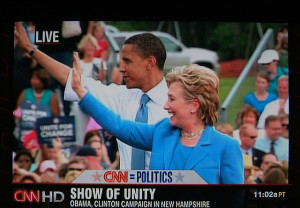
Hillary Clinton and Barack Obama in a show of unity in 2008.
A true realist might not care who wins the 2016 Democratic presidential primary contest, so long as it’s the Democrat who is most likely to defeat the Republican nominee. The prize is winning the White House, and all the advantages that entails, from nominating U.S. Supreme Court justices to conducting foreign policy to pursuing or protecting social agendas on everything from God to guns to gay marriage. We have an ongoing series about the differences between having a Democrat versus a Republican in the White House, and the list is very long. While there are differences between the Democratic candidates, those differences pale in comparison to the Republican candidates. So let’s take a realistic look at the Democratic primary race:
Hillary Clinton — Objectively, one could say Clinton is the best-prepared presidential candidate for president among the Democrats or the Republicans this year. Clinton has experience in foreign policy, healthcare and many other subjects. However, being president isn’t only about one’s resume. What else does Clinton have?
First, Hillary has been thoroughly vetted by the Republicans and the media for over 20 years. Some pundits, like Maureen Dowd and Patrick Healy of the New York Times, have been publishing regular hit pieces, whether veiled or not, against the Clintons during this time. The Republican Party and its backers have made going after the Clintons a cottage industry. These attacks only seem to make Clinton stronger, and at this point it’s hard to imagine any other issues about Hillary that have not already been unearthed and extensively aired.
Likewise, Clinton has been through the intense scrutiny of a presidential campaign. In fact, counting Bill Clinton‘s campaigns, Hillary has been through three of them. There’s nothing like running for president, and Clinton’s having done so is a big advantage. Indeed, no one has ever run for president alongside a spouse who was president for two terms, and who can advise her every step of the way.
Hillary Clinton also has a record squarely in line with Democratic Party values, yet not so liberal as to become a caricature. Clinton’s progressive bona fides include working for the Children’s Defense Fund, campaigning for liberal Democratic presidential candidates Eugene McCarthy and George McGovern, and being appointed by President Jimmy Carter to the Legal Services Corporation Board of Directors. Moreover, Hillary spearheaded the effort to establish universal healthcare coverage in the 1990s, battling the health insurance companies in the process. Clinton was also instrumental in the passage of expanded children’s health insurance (“CHIP” or “S-CHIP”).
Bernie Sanders — The progressive base of Democratic primary activists loves Bernie Sanders. He should be given credit for increasing Democratic excitement for 2016. However, Sanders has some disadvantages.
First, Sanders is quite old to be president. Sanders is 74, and will be 75 before Election Day 2016. In the age of 24-7 communications and fast-moving global events, the presidency is a physically demanding job. A president in his late 70s (and early 80s if re-elected) seems dangerously old. While Hillary Clinton at 68 is no spring chicken, those six years could make a big difference to voters, and in doing the job of president.
Second, Sanders’ vision for America is aspirational but unrealistic. Break up the big banks? End for-profit health insurance? How likely is this given the huge numbers of Republicans in Congress (much of it due to GOP gerrymandering of House districts, which carries through at least until 2020) and the Republican majority on the U.S. Supreme Court?
Third, Sanders has not been vetted by Republicans and the media. The GOP will likely eviscerate him with ads talking about what a dangerous socialist (which they will morph into “communist”) he is. Many low-information voters will lap this up. Sanders and his supporters will spend much of their time on defense, giving “no he isn’t” explanations that kill a campaign’s message. As Willard Mitt Romney and others have said, “if you’re explaining, you’re losing.”
Fourth, Sanders has some problematic votes as a U.S. Senator. In a year when gun violence is a huge issue, Sanders must defend past votes against the Brady Bill, in favor of gun manufacturer immunity from liability, and to allow guns on Amtrak trains and in national parks. Sanders’ recent flip-flop on gun manufacturer immunity raises questions about his credibility and his support for such causes.
Fifth, Sanders is running a bizarre campaign against the very Democratic Party whose machinery he is using to run for president. Sanders has made destructive attacks not just against Hillary Clinton (for example, comparing Clinton to Dick Cheney), but also against Democratic-supporting groups such as Planned Parenthood and the Human Rights Campaign, simply because they endorsed Clinton. Sanders is also at war with the Democratic Party establishment, again while running in the Democratic Party primaries. Senator Sanders is veering close to Ralph Nader “both parties are bad” territory, but at least Nader ran in a third party. It’s unclear whether Democratic Party voters will put up with Sanders’ scorched-earth strategy for the duration of the primary season.
Martin O’Malley — Who? It’s unclear why O’Malley is still running, and what gap he possibly fills that isn’t covered either by Clinton or Sanders, or both. Perhaps O’Malley is waiting for a possible Vice Presidential nomination. Otherwise, this doesn’t seem to be his year to run for president.
It seems Democratic primary voters have some tough choices to make if they want to avoid the disaster of a Republican victory in 2016.
Photo by Tony Fischer, used under Creative Commons license. http://is.gd/shcdUI


